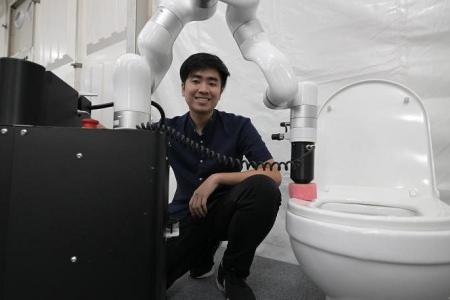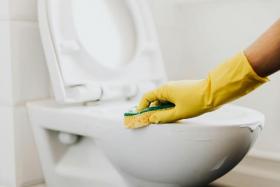Builder of toilet-cleaning robot took unconventional internship of cleaning loos
Mechanical engineering graduate Tuan Dung Nguyen rolled up his sleeves and took an uncommon internship as a toilet cleaner to understand the nitty-gritty of the work.
He applied for several stints to clean the loos at hospitals, hotels and the National University of Singapore (NUS) with a mission in mind: To design a robot that can clean toilets.
His first shift took place at NUS in 2023 on a January morning, when he shadowed a cleaner who showed him how to clean multiple toilets efficiently.
Mr Nguyen, 23, co-founder of HiveBotics, a start-up building a toilet-cleaning robot, said: “She showed me all the tools needed, like the protective equipment and masks, and how to get the right mix of chemicals to scrub off stains properly.”
Soon, he worked his shifts alone.
Even though there were not many toilet users then as it was a study week, Mr Nguyen found the work tiring. “I couldn’t do any (other) work for the rest of the day,” he said about juggling work as a cleaner and at HiveBotics.
Cleaning became trickier when students returned, he recalled. Some users would make a mess in the toilets in the late hours, leaving it overnight for cleaners to tidy up in the morning.
“The busier the area, the more there is to clean,” said Mr Nguyen. This was especially so in malls, where he would find clumps of toilet paper in the morning.
For most cleaners, toilets are just one of the areas they are assigned to clean. And it is also the place they dread the most, he learnt.
Employers find it hard to hire enough cleaners, he said. Some cleaners even state in their contracts that they do not want to clean toilets, his colleagues told him.
“Many cleaners I worked with are seniors, and cleaning the toilets is very tiring for them,” he said. “On top of this, they also have the general areas to clean – like classrooms or canteens.”
The issue is not limited to schools or hotels. A study by the Ministry of Manpower in 2023 found that cleaners are among the toughest operational roles to hire for today, along with bus drivers and security officers.
Mr Yuen Kok Yew, 50, a cleaner at a hawker centre in Punggol, said robots could come in handy to support the shortage of cleaners.
Where he works, only two cleaners are assigned to keep the toilets and other premises clean each day.
He said in Mandarin: “It could be helpful in the future. But the robot needs to be able to get into areas difficult to clean, and the cleaners will probably still need to be around to monitor its progress.”

Get The New Paper on your phone with the free TNP app. Download from the Apple App Store or Google Play Store now


